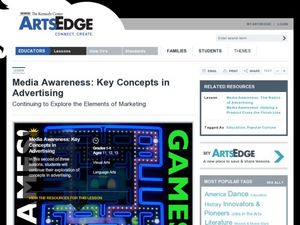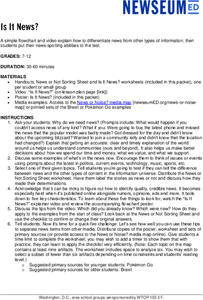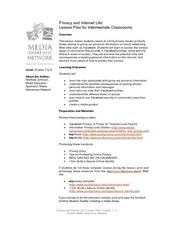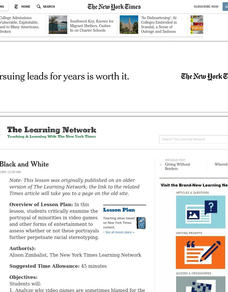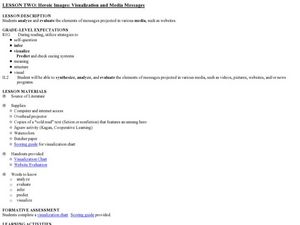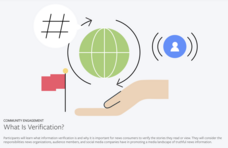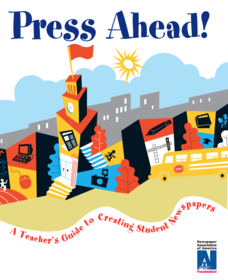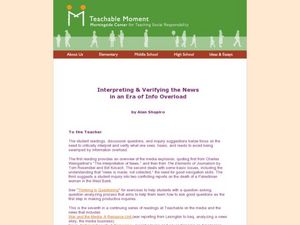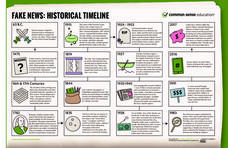Curated OER
Rules of Conduct: Media Violence, Dating and Teenage Behavior
Students discuss the role of media in their lives and making decisions. In groups, they define violence and identify how it is represented in the type of entertainment they are accustomed to viewing. They compare and contrast behaviors...
Curated OER
Media Literacy Unit - Part 4
Seventh graders study how advertisers use techniques to sell their products. In this persuasive media lesson, 7th graders analyze media messages to find the advertiser's purpose. They examine different advertising techniques and their...
Curated OER
Lesson 10:Media
Second graders share their expository writing pieces. In this expository writing lesson, 2nd graders create a visual media product to give to their parents to invite them to an author celebration. They bring props and share their writing...
Curated OER
Media Awareness: Key Concepts in Advertising
Young scholars examine the basic concepts of advertising. In this media awareness lesson, students discuss target audience, art, and purpose in advertising to determine what makes an advertisement effective or ineffective. Young...
Curated OER
Studying the Use and Effect of Media
Students consider mediums used to explore current issues. In this media awareness lesson, students use a Venn diagram to compare the meaning of the painting "The Scream," to that of a selected political cartoon.
News Literacy Project
News Goggles: Tracking Developing Stories
A 28-slide presentation introduces viewers to the process reports go through to track and verify developing news stories. Using the reports of the attacks at Atlanta, Georgia, massage parlors as an example, viewers are taught what to...
Newseum
Is It News?
Is it news or not? That is the question young journalists must consider in a lesson plan about newsworthiness. Class members watch a short video that details five key characteristics of quality, credible news. Individuals then use these...
Curated OER
Media Messages
Students analyze advertisements and decide what message is being conveyed. For this media lesson, students analyze drawings from a tall tale. Students view drawings from the book Johnny Appleseed and discuss the colors of the drawings...
Curated OER
Fact and Opinion Lesson Plan
How are fact and opinion different? Middle schoolers explore fact and opinion and write articles pertaining to a football match, eliminating all opinion statements in order to focus on the facts. Then they discuss bias in the media....
Curated OER
Privacy and Online Life: Protect Yourself
Help your class protect privacy, security, and their online profiles with this examination of social media, especially Facebook, and who can see what about each of us. Resource contains useful links for learners to conduct their own...
Curated OER
Beyond Black and White
Students critically examine the portrayal of minorities in video games and other forms of entertainment and assess the role of racial stereotyping. They keep a log of media minority portrayals and respond to their findings.
Curated OER
Heroic Images: Visualization and Media Messages
Students examine media messages. In this media awareness lesson, students analyze online messages about heroism as they complete a jigsaw reading activity.
Facebook
What Is Verification?
One of the most important skills news consumers and social media users must develop is the ability to determine the veracity of stories they read or view. Here's an interactive lesson plan that teaches high schoolers how to verify news...
Teaching Tolerance
You Are the Product
What does it mean for a product or service to go viral? Scholars explore the topic by reading an article about the economics of social media. After reading, they complete a 3-2-1 data chart with information they learned from the text and...
Newseum
Bias Through History: Analyzing Historical Sources
Young journalists use the E.S.C.A.P.E. (evidence, source, context, audience, purpose, and execution) strategy to evaluate historical and contemporary examples of bias in the news. The class then uses the provided discussion questions to...
profitt.gatech.edu
Effective Communication: Listening, Speaking, Writing, Interpreting
Help young learners become active listeners and strong public speakers with a set of activities that range from paraphrasing, to discussions, and self-reflection. Additionally, the lessons address social media skills and non-verbal...
American Press Institute
Newspapers in Your Life: What’s News Where?
Big news isn't necessarily newsworthy everywhere! How do journalists decide what to cover with so much happening around them? A instructional activity on media literacy examines the factors that affect the media's choice of stories to...
Newspaper Association of America
Press Ahead!
Give class members some great news! A media unit teaches individuals about ethics, parts of a newspaper, business writing, photojournalism, and more topics that have to do with the press. Full of material for a variety of learners,...
Media Smarts
Making Media for Democratic Citizenship
Pupils analyze global issues. In this video podcasting lesson plan, pupils research Internet and print sources regarding selected global development issues. Pupils plan and create video podcasts that feature their research findings.
Curated OER
Interpreting & Verifying the News in an Era of Info Overload
Students practice their critical thinking skills. In this media awareness lesson, students read articles about media overload and interpretation of media. Students respond to discussion questions and discuss how they verify news....
Curated OER
Mixed Media Messages: Reduce, Reuse, Recycle
Students examine the process of recycling by creating a mock television commercial about recycling. In this recycling lesson, students watch an animated demonstration about recycling and answer content questions. Students play an online...
Common Sense Media
Fake News: Historical Timeline
In 1874, The New York Herald falsely claimed that several animals escaped from the Central Park Zoo, and panic ensued. Using the helpful infographic, pupils discover more instances of fake news throughout history, from as far back as 63...
Newseum
Covering a Catastrophe: Evaluating Disaster News
Young journalists investigate the various ways to share news about a disaster and evaluate the pros and cons of each of these types of news. Individuals then select two different forms of media reports of a recent disaster. Using the...
Media Smarts
Media Awareness Network: Hate or Debate?
Discuss the difference between legitimate debate on a political issue and arguments that are based on hate through a science-fiction scenario that shows how a controversial issue can be discussed in both ways. Then learn how purveyors of...
Other popular searches
- Media Education
- Communications and the Media
- Media Organizations
- Digital Media
- Media Center
- Information Media & Technology
- Mixed Media
- Media Bias
- Media Influence
- Media Education Propaganda
- Media Censorship
- Media Education Esl





